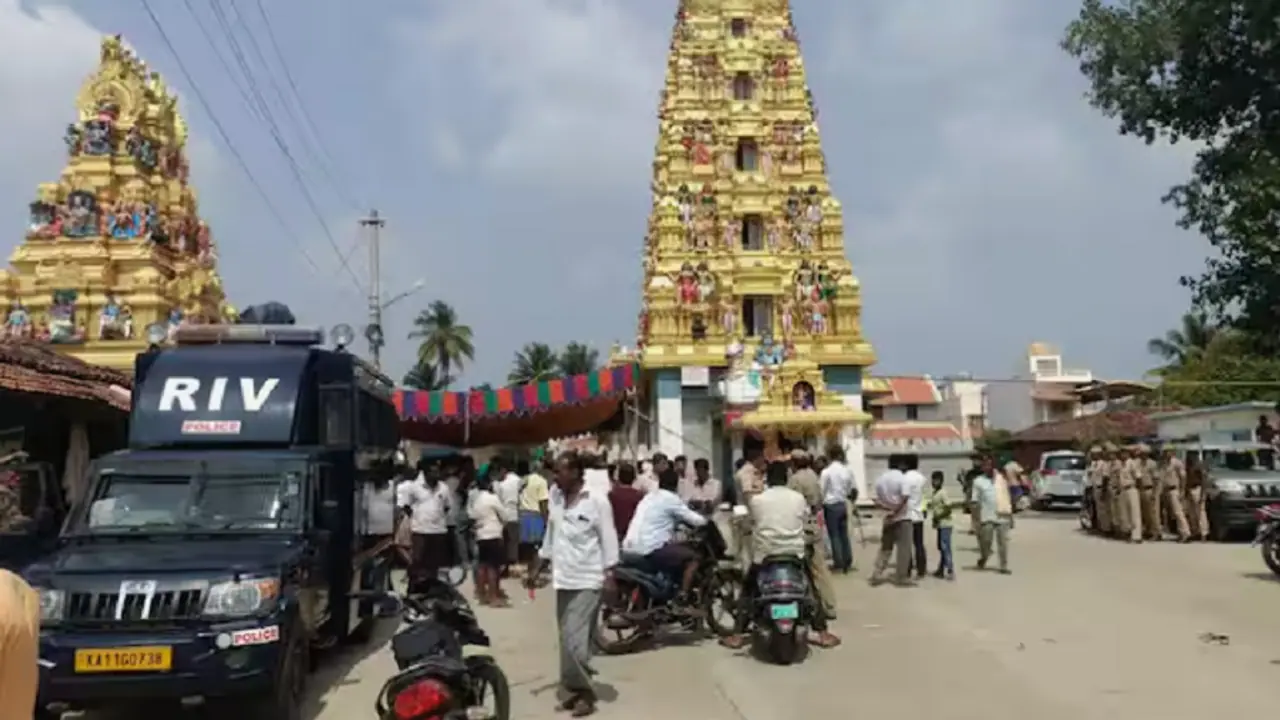In a landmark event, Dalits entered Sri Kalabhairaveshwara Swamy temple in Hanakere, Mandya, amid strong opposition from upper castes. Despite escalating tensions and protests, authorities upheld the Dalits' right to worship, deploying police to maintain order and prevent conflict.
In a historic move, Dalits entered the newly renovated Sri Kalabhairaveshwara Swamy temple in Hanakere village, Mandya district, two years after its renovation. This took place despite strong opposition from the upper castes, who had long resisted Dalits' entry into the temple. The Dalits were allowed to worship under the protection of local authorities and police personnel.

The controversy began when Dalits, under the protection of authorities, entered the temple to offer worship. Their entry, however, was met with fierce resistance from the upper-caste villagers. The situation escalated when members of the upper class broke the stone nameplate of the temple inauguration ceremony in front of the temple, expressing their outrage. A group of them even attempted to remove the idol, with one of the upper-caste villagers saying, “Let them keep the temple; we will take the god,” as they brought out the Utsav Murthy.
Karnataka HC grants bail to man accused of refusing marriage over bride's Dalit caste
One of the local villagers, a member of the upper castes, voiced his displeasure over the Dalits' entry. “We built the temple with money earned by everyone, yet the Dalits have never been allowed inside. To facilitate their worship, shrines for Shri Chikamma and Shri Manchamma have been constructed,” he said. He also questioned the local authorities, including the Tehsildar, the social welfare department, and police officials, for allowing the Dalits to break this longstanding tradition.
Tehsildar Shivakumar Biradar, however, asserted that the Sri Kalabhairaveshwara Swamy temple is managed by the Muzrai Department and is open to all castes, religions, and races. "No one can prevent anyone from entering the temple. If anyone obstructs entry, legal action will be taken," he warned.
The Dalits, who had been trying to enter the temple for the past month, had been repeatedly stopped by the upper-caste villagers. Despite multiple attempts to facilitate a peaceful resolution through meetings, including those chaired by former MLA M. Srinivas, the upper castes remained firm in their refusal to allow the Dalits to enter.
Tensions reached a peak on Saturday evening when Dalits once again attempted to enter the temple but were blocked by upper-caste members. The dispute led to a tense situation, with a large police presence deployed in the village. The authorities, however, made it clear that the temple belongs to the public and that the Dalits must be allowed to worship.
The following day, on Sunday, another attempt was made by the Dalits to enter the temple, leading to further resistance from the upper castes. Former MLA M. Srinivas called for a discussion with the temple committee members, but they refused to engage in talks. The temple committee insisted that if the Dalits were allowed entry, the upper castes would no longer participate in temple rituals. One committee member said, “We will not enter the temple again if they are allowed to worship here.”
Karnataka SHOCKER! Dalit woman made to sleep in dog-shed, allegedly poisoned to death by husband's family
Amid the standoff, Dalits were escorted into the temple by former MLA M. Srinivas, Tehsildar Biradar, police officials, and the Social Welfare Department. This marked the first time Dalits were allowed to worship Sri Kalabhairaveshwara Swamy at the temple, which had been a point of contention for years.
Despite the tensions, the authorities remained firm in their stance, reiterating that all citizens, regardless of caste, have the right to access public places of worship. The temple's entrance was closed after the Dalits' visit, and police security remained in place to prevent further unrest. The situation in Hanakere remains volatile, with both sides refusing to back down.
